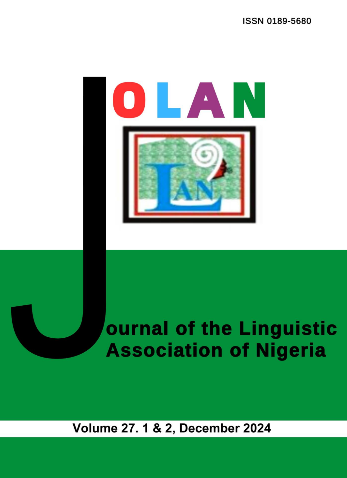An Ethnographic Analysis of Proverbs in Christian Films: ‘The Missing Link’ as a Case Study
Keywords:
Proverbs, The Missing Link, Hymes’ Ethnography of Communication, Films, Religious DiscourseAbstract
Much scholarly research has been carried out on proverbs used in Yoruba traditional plays and films. However,
little attention has been devoted to the use of proverbs in Christian films. This study, therefore, examines the use
of proverbs in “The Missing Link”, a Christian film produced by EVOM, a prominent Christian film producer
in Nigeria in order to reveal their aesthetic and utilitarian values in religious discourse. Hymes’ Ethnography of
Communication was used as the theoretical framework. Fourteen proverbs, as employed in different contexts of
the film were purposively selected for analysis. One major discovery is the fact that these proverbs were employed
in the film to project the Yoruba socio-cultural ideologies and orientation. King Adegbite, the custodian of the
people’s custom and culture used 6 of the 14 proverbs captured in the film. This represents 42.8% of the total
number of proverbs used in the film. The priests used 4 between themselves, which constitutes 28.5%. Chief
Balogun used 1, which constitutes 7.1%. Alamu and Ajadi used 3 proverbs between themselves, which constitutes
21.4% of the total number of proverbs in the film. All the proverbs used in the play were used by elderly men
who are typical traditionalists. None was used by children or women. All the users of the proverbs were village
dwellers, the urban dwellers represented by the missionaries did not use any proverb, instead they used quotations
from the Bible, characteristic of Christians. Proverbs are a veritable mine full of the collective wisdom of the
elderly people in the typical traditional Yoruba society. Contemporary Christian films producers now use them
abundantly in their works to capture the indigenous local settings of their plays.
References
Adedeji, J. A. (1971). The Church and the Emergence of Nigerian Theatre. 1915-1945. Journal of Historical Society in Nigeria. Vol. VI, No. 1, June, 1973.
Adedeji, J. A. (1973). The Church and the Emergence of Nigerian Theatre. 1941-1966. Journal of Historical Society in Nigeria. Vol. VI, No. 4, December, 1973.
Adejumo, A. (2009). Power Perspective in Yoruba Fauna Proverbs in Odebunmi, A. et. al., Language, Gender and Politics: A Festschrift for Yisa Kehinde Yusuf. Lagos: Concept Publishers Limited. 451-461
Adeleke, D. A. (2009). Aspects of Yoruba history in proverbs in Odebunmi, A. et. al., Language, Gender and Politics: A Festschrift for Yisa Kehinde Yusuf. Lagos: Concept Publishers Limited. 463-476
Ajibola, J. O. (1947). Owe Yoruba. London: Oxford University Press.
Akinyemi, A. (2007). The Use of Yoruba Proverbs in Akin Isola’s Historical Drama. Madam Tinubu: Terror in Lagos Provebium 24, pp. 17-37
Alaba, O. (1986). Agbeyewo Owe Iwoyii. Lamgbasa: Jona Ise Akada ni Ede Yoruba 3, pp. 51-66
Bamgbose, A. (1968). The Form of Yoruba Proverbs. ODU. Journal of African Studies. 4(2), pp. 74-86
Clark, Ebun (1979). Hubert Ogunde: The Making of Nigeria Theatre. Oxford: Oxford University Press.
Clark, Ebun (1981). Ogunde Theatre: The Rise of Contemporary Theatre in Nigeria. 1946-1972. In Ogunbiyi (ed.) Drama and Theatre in Nigeria: A Critical Source Book. A Nigerian Magazine Publications. pp. 292-319
Crowther, S. A. (1852). A Grammar and Vocabulary of the Yoruba Language. London: Seeleys.
Delano, I. (1966). Owe Lesin Oro. Ibadan: University Press. Echeruo, J. C. (1981). Concert and Theatre in Late 19th Century Lagos. In Yemi Ogunbiyi (ed.) Drama and Theatre in Nigeria, Nigeria Magazine. Department of Culture, Federal Ministry of Social Development, Youths, Sports and Culture, Lagos, Nigeria.
Hymes, D. (1964). Towards Ethnographies of Communication: The Analysis of Communicative Events. In Gigioli, P. (ed.). Language and Social Context. London: Penguin Books.
Kehinde, A. (2004). Proverbs as Thematic Vehicle in Recent African Short Fiction. Proverbium 21, pp. 119-136
Ogunba, O. (1968). Modern Drama in West Africa. In Journal of Nigeria English Studies Association. Vol. 2, No. 2, pp. 149-151
Ogundeji, P. A. (1988). A Semiotic Study of Duro `Ladipo’s Mythical Historical Plays. Unpublished PhD Thesis, University of Ibadan, Ibadan, Nigeria.
Olatunji, O. (1984). Features of Yoruba Oral Poetry. Ibadan: University Press.
Olujinmi, B. (2012). The Utilitarian Value of Yoruba Proverbs to Entrepreneurship. Yoruba Journal of the Yoruba Studies Association of Nigeria. Vol. 7, No. 1, pp. 192-213
Raji-Oyelade, A. (2004). Posting the African Proverb: A Grammar of Yoruba Postproverbials or Logophogia, Logorrhea and the Grammar of Yoruba Postproverbials. Proverbium 21. pp. 299-314
Sheba, L. (2006). Yoruba Proverbs with Feminine Lexis. Ibadan: Spectrum Books Limited.
Taylor, A. (1931). The Proverb. Cambridge: Harvard University Press.
Vidal, E. D. (1852). Introductory remarks in Crowther, S. A. A Grammar and Vocabulary of the Yoruba Language. London: Seeleys.
Yusuf, Y. K. (1994). Women’s Speech in Yoruba Proverbs. Proverbium 11, pp. 283-291














